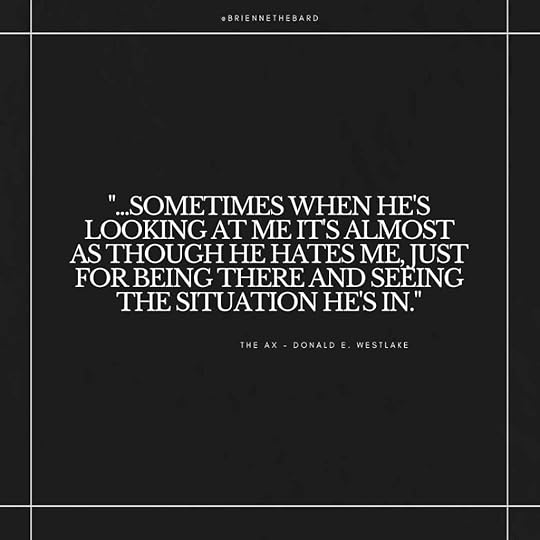Book Report: The Ax by Donald E. Westlake
I recently decided to start differentiating my thoughts on books into two categories. I’m now doing both book reviews and book reports. Book reviews are spoiler-free reading recommendations with a 1-5 star rating. Book reports are spoiler-filled explorations of themes, characters and questions posed by the author. Click here to read my book review on The Ax.
The Ax is the story of Burke Devore, former mid-level paper mill manager turned unemployed sociopath. Right away Burke’s tone with us is so casual that it feels like he’s telling us this story over a cup of joe at one of the diners he frequents. This first-person perspective is important as it eases us into the realization that this character we’re having coffee with? is a freaking serial killer!
Of course Burke’s not going to refer to himself that way. He’s going to explain to us in precise detail why he has no other choice than to begin his murder spree. It’s not Burke’s fault, it’s society! According to Burke we’re the first generation of people on Earth to start “throwing away” people in the prime of their productive lives and he is not ready to be tossed onto the ice flow.
And we’re with him right from the start! Yeah! We all know that the rich just get richer and the poor at least receive help while those of us in the middle suffer in silence. We sit side by side with Burke as he experiences the stages of grief over the loss of his job. Or more accurately, his self. As the narrative continues we slowly begin to realize how reliable (or perhaps not) a narrator Burke is.
 DENIAL: There’s no way Burke could be among the many who would lose their careers in layoffs during the 90s tech boom. Or even if he was, he would be MUCH further down the list. ANGER: Burke later explains to his marriage counselor how he began to see other employees, once friends, as enemies. Once they were fired the were only competition with one another.BARGAINING: Burke seems to make an unspoken deal with the universe that if he is able to stomach doing some very difficult things (mur-der) he should be rewarded with his middle-of-the-road “dream” job. It’s important to note here that this job isn’t amazing. He’s not striving for pie in the sky, he’s willing to settle. DEPRESSION: Burke describes periods during his initial layoff where it was difficult for him to even get out of bed. He is withdrawn and aloof and his relationship with his wife deteriorates to the point that she chooses to have an affair. ACCEPTANCE: I would argue that we are introduced to Burke right after his depression phase has ended and the majority of the book is Burke’s acceptance phase. He has simply chosen to accept the situation in a different way than I’d say most of us would.
DENIAL: There’s no way Burke could be among the many who would lose their careers in layoffs during the 90s tech boom. Or even if he was, he would be MUCH further down the list. ANGER: Burke later explains to his marriage counselor how he began to see other employees, once friends, as enemies. Once they were fired the were only competition with one another.BARGAINING: Burke seems to make an unspoken deal with the universe that if he is able to stomach doing some very difficult things (mur-der) he should be rewarded with his middle-of-the-road “dream” job. It’s important to note here that this job isn’t amazing. He’s not striving for pie in the sky, he’s willing to settle. DEPRESSION: Burke describes periods during his initial layoff where it was difficult for him to even get out of bed. He is withdrawn and aloof and his relationship with his wife deteriorates to the point that she chooses to have an affair. ACCEPTANCE: I would argue that we are introduced to Burke right after his depression phase has ended and the majority of the book is Burke’s acceptance phase. He has simply chosen to accept the situation in a different way than I’d say most of us would. 
Following Burke’s story during this phase of his life results in two questions. 1. Will Burke get away with this? and 2. Can Burke be made to understand what he’s doing is wrong and change the way he accepts his situation? The second question is obviously much more difficult because to accomplish it would require Burke to seriously examine himself and let go of many toxic ideas.
That’s why his marriage counseling visits become such an interesting part of the novel. Several times throughout the book it feels like Burke has almost reached the enlightenment he needs. I admit to frustratedly turning pages waiting for his therapist to dig just a tiny bit deeper.
That’s part of the point though. Examining why you feel the way you do and understanding your reactions to situations is essential to the functions of life. The theme of evolution is woven throughout the story with the idea being that while yes, we’ve come so far in many ways (technology) yet we remain so ignorant in others (getting rid of workers in the prime of their lives). How evolved can we be if we’re beholden to our impulses? Have we really made it that much farther than cave men if we react without reason?
While there wasn’t a pithy phrase for it at the time of publication another of this book’s majors themes is toxic masculinity. It’s a fascinating insight into the mind of a man who cannot separate his identity from his career. Burke is the job. The job is Burke.
By the end of the book I was asking myself if we, society, share some responsibilities in tragedies like this. Burke made the choices he made, but is there a deeper conversation around work and identity? What expectations do we have of our workers? Our men? Who do we reward and what are we rewarding them for?
After all, Burke eventually got his dream job.



